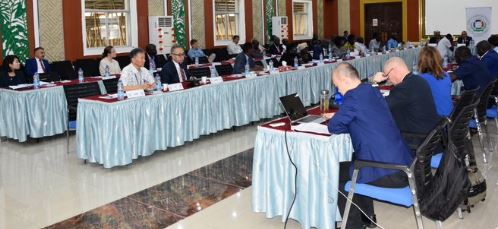Senior representatives of the parties to the 2018 peace agreement at the Ceasefire and Transitional Security Arrangements Monitoring and Verification Mechanism (CTSAMVM) have attributed the recent killings of civilians in Central Equatoria State’s Wonduruba Payam and clashes between the army and youth in Nasir County in Upper Nile to delays in implementation of the security arrangements.
Speaking during the CTSAMVM meeting in Juba on Tuesday, Maj Gen. Andrew Mangu, a senior member of the Sudan People’s Liberation Movement in opposition (SPLM-IO), said the killings would not have happened if the security arrangements were implemented.
“If there were to be a conducive environment, our civilians are not supposed to be killed in Wonduruba by armed civilians. Delays are the cause of this insecurity,” he stated. “When I heard from the CTSAMVM report calling for the deployment of the first phase of the graduated forces, I doubt it because it has taken three years now.’
According to the SPLM-IO official, there has been no response from President Salva Kiir since the submission of the list of names of offices from the parties to the peace agreement to finalize the unification of the forces.
“The list of the officers has been submitted to the president of the republic since July up to now nothing has been done about it,” He said, and asked: “What is wrong?”
For his part, Maj. Gen. Bior Leek Kuareng, the representative of the former detainees, said people are currently calling for the removal of the SSPDF forces in Nasir County following continuous clashes between the army and youth there.
“If the parties are to divide this country to their affiliations today, this is not acceptable,” he said. “Today in Nasir, people say remove the SSPDF from Nasir and also in Wonduruba.”
He however questioned who will protect the citizens in the country if the army is removed without the unification of forces. While the root cause of conflict in Nasir County between the army and youth remained unknown, Gen. Kuareng also questioned the leadership of the group in Upper Nile known as the White Army.
“Who is leading that White Army that could be held responsible for the clashes in Nasir? I want to see someone answer these questions,” he charged. “Who is responsible because people have died there and they want the other party to be responsible.”
This comes after armed men raided a village in Wonduruba Administrative Payam earlier this month killing ten civilians shortly after a visit by Governor Augustino Jadalla to the area.
Killings have become rampant across South Sudan, mainly perpetrated by unknown armed civilians, holdout groups, and intercommunal fighting among others, with the most recent being over the weekend in Kangapo One in Kajokeji County where four bodaboda raiders were shot dead.




